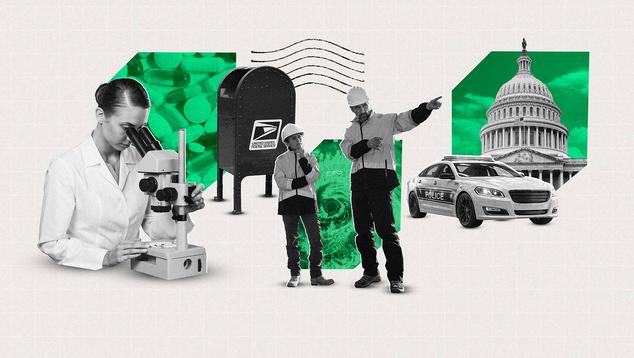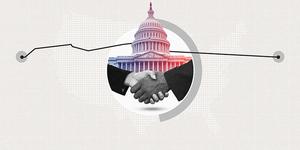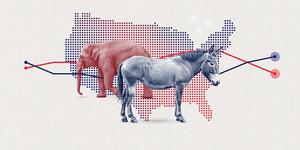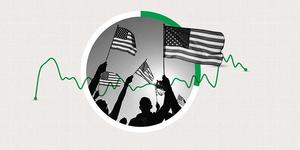Story Highlights
- Ratings of FEMA, CIA, CDC, FDA, EPA, IRS have declined significantly
- Democrats’ positive ratings of most agencies have fallen; Republicans’ have improved
- U.S. Postal Service is again the only agency with a majority-level rating (56%)
WASHINGTON, D.C. — Americans’ ratings of six prominent federal government agencies have deteriorated markedly since last year. The job ratings of each of these agencies — the Federal Emergency Management Agency (FEMA), Central Intelligence Agency (CIA), Centers for Disease Control and Prevention (CDC), Food and Drug Administration (FDA), Environmental Protection Agency (EPA), and Internal Revenue Service (IRS) — are now at or near their lowest points in Gallup’s trend.
Meanwhile, only one of the 15 agencies measured both last year and this year, the Department of Homeland Security, has seen a significant improvement in its job rating.
As was the case last year, the U.S. Postal Service is the sole government agency garnering a majority-level positive rating for its work. It is also the only agency rating that has not worsened among Democrats and Democratic-leaning independents since last year.
At the same time, largely reflecting the change from a Democratic to Republican administration, Republicans and Republican-leaning independents now evaluate nearly all agencies more positively than they did in 2024. As a result, majorities of Republicans now rate the Department of Homeland Security, the Department of Defense and the Federal Bureau of Investigation (FBI) positively, whereas no agency earned majority-level support from Republicans a year ago.
These findings are from a Sept. 2-16 Gallup poll, completed before the partial federal government shutdown that took effect on Oct. 1 after Congress failed to pass a funding bill.
Seven Agencies’ Ratings Have Changed Significantly Since Last Year
The decline in agency job ratings since 2024 is greatest for FEMA (20 percentage points), the CIA (10 points) and the CDC (nine points). The FDA and EPA have fallen seven points each, and the IRS is down six points. These agencies’ job performance ratings as “excellent” or “good” range from 25% to 31%, which are record lows for all but the IRS, which was one point lower in 2013.
The sole agency that has seen a significant improvement in its rating this year, the Department of Homeland Security, has risen by 10 points to 42% from last year’s record low, but it remains well below the high of 59% in 2017.
Postal Service Rated Positively by Majority in U.S.
The U.S. Postal Service, which has been among the highest-rated agencies since it was first included in Gallup’s periodic government agency assessments in 2014, currently receives a 56% positive rating. Americans are about evenly split on the next highest-rated agencies, the Department of Defense and NASA, with both earning 48% excellent/good ratings.
Majorities of Americans rate the job performance of the other 14 agencies as “only fair” or “poor.” Between 36% and 42% of U.S. adults offer positive ratings of the FBI, Secret Service and Department of Homeland Security.
In addition to the six agencies that have seen significant declines in their ratings since last year and the Department of Homeland Security, less than 35% of U.S. adults rate six others positively. These include the IRS, State Department, Federal Aviation Administration (FAA), Justice Department, Federal Reserve Board and Department of Veterans Affairs (VA), which has a 25% record-low rating this year.
Partisans Split Sharply on Ratings of Federal Agencies
There is a sharp partisan split in most agencies’ ratings. As the Trump administration is employing the military and the Department of Homeland Security in its efforts to control illegal immigration and crime in the U.S., majorities of Republicans and Republican leaners give the Departments of Defense (74%) and Homeland Security (73%) broadly positive ratings. A slim majority of Republicans, 51%, also rate the FBI positively. During the poll’s field period, the FBI was involved in apprehending the man who murdered conservative activist Charlie Kirk on Sept. 10.
For their part, Democrats and Democratic leaners express majority-level positive ratings for two agencies — the U.S. Postal Service (66%) and NASA (52%).
Meanwhile, FEMA, the EPA and the CDC have similarly low ratings among both major parties.
While only three agencies receive significantly higher ratings from Democrats than Republicans (the IRS, Federal Reserve and Postal Service), 10 are viewed much more positively by Republicans than Democrats. The largest of these gaps between the two parties are for the Department of Homeland Security (59 points), Department of Defense (48 points), Justice Department (34 points), State Department (29 points), FBI (28 points) and Secret Service (21 points).
Republicans’ ratings of most of the agencies have improved since last year, while Democrats’ have worsened. Similar shifts in partisans’ ratings have occurred following changes in the sitting president’s party, including during Donald Trump’s first presidency and in 2021 after Joe Biden took office.
Still, of the agencies measured in 2019 during the first Trump administration and now, Republicans are only more positive about one today (Homeland Security), while Democrats are less positive about all of them now than in 2019.
It is also notable that the Secret Service’s rating has rebounded among Republicans since last year’s record-low reading following security lapses that resulted in the attempted assassination of Trump in Butler, Pennsylvania.
Bottom Line
Americans’ job ratings of six federal agencies have deteriorated sharply since last year, and they are at or near their lowest points in Gallup’s trend. The only agency to show significant improvement is the Department of Homeland Security; however, it remains far below its 2017 peak. At the same time, the U.S. Postal Service continues to stand out as the highest-rated agency, maintaining a majority-level positive rating.
Partisanship plays a central role in shaping views of government agencies. Republicans now rate the Department of Defense, Department of Homeland Security and FBI positively, while Democrats give majority-level approval only to the Postal Service and NASA. The largest partisan divides are seen in ratings of Homeland Security and Defense. Republicans’ views of most agencies have improved since last year, while Democrats’ have worsened. These partisan swings suggest both politics and performance drive confidence in government.
Stay up to date with the latest insights by following @Gallup on X and on Instagram.
Learn more about how the Gallup Poll Social Series works. View complete question responses and trends (PDF download).




